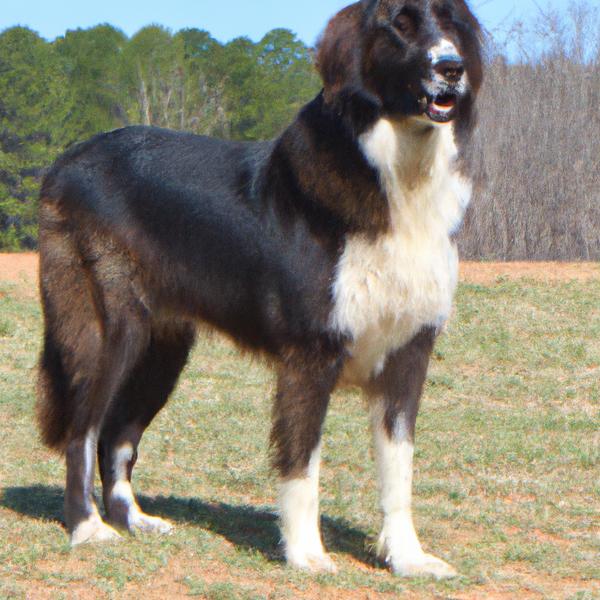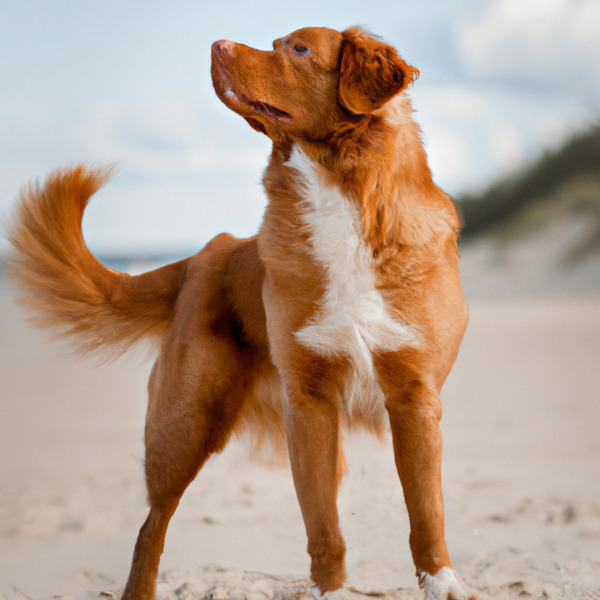Nova Scotia Duck Tolling Retriever vs. Cursset: Breed Differences and Similarities
Hypoallergenic
Are Nova Scotia Duck Tolling Retrievers or Curssets hypoallergenic, or neither?
Unfortunately, neither Nova Scotia Duck Tolling Retriever nor Cursset are hypoallergenic, which may not make them the best choice for dog lovers who suffer from pet allergies.
Temperament
What are the personalities of Nova Scotia Duck Tolling Retriever and Cursset dogs?
Affectionate
Courageous
Gentle
Responsive
Alert
Energetic
Playful
Active
Protective
Friendly
Affectionate
Loyal
Devoted
Gentle
Tempered
Kind
Sweet
Tenacious
Trainable
Fearless
Shedding Level
Do Nova Scotia Duck Tolling Retrievers shed more than Curssets, or which breed sheds more, Nova Scotia Duck Tolling Retrievers or Curssets?
Nova Scotia Duck Tolling Retriever or Cursset dogs are not heavy shedders, but they will lose a significant amount of hair each year. To decrease the amount of shedding, you can regularly brush your Nova Scotia Duck Tolling Retriever or Cursset. This will remove loose hair and keep their coat growing in the same direction.
Ancestry
What are the origins of Nova Scotia Duck Tolling Retriever and Cursset breeds?
Cocker Spaniels, farm Collies, Irish Setters
Black Mouth Cur and Basset Hound
Date of Birth
When were Nova Scotia Duck Tolling Retriever and Cursset breeds first developed?
19th Century
Unknown
Eye Color Possibilites
What are the eye colors of Nova Scotia Duck Tolling Retriever and Cursset dogs?
Hazel
Brown
Amber
Brown
Nose Color Possibilites
What are the natural nose colors of Nova Scotia Duck Tolling Retriever and Cursset?
Black
Brown
Black
Coat Color Possibilites
What are the natural colors of the coat for Nova Scotia Duck Tolling Retriever and Cursset breeds?
Red
Brown
Black
Fawn
Brindle
Coat Length
What is the typical coat length for Nova Scotia Duck Tolling Retriever and Cursset breeds?
Nova Scotia Duck Tolling Retrievers have medium-length coats.
Curssets have coats that can be either short or medium in length.
Coat Density
What is the density of the coat of Nova Scotia Duck Tolling Retriever and Cursset?
Coat Texture
What is the hair texture of Nova Scotia Duck Tolling Retriever and Cursset?
Straight
Litter Size
What is the usual litter size for Nova Scotia Duck Tolling Retriever and Cursset?
A Nova Scotia Duck Tolling Retriever can have a litter of 12-14 puppies on average. However, it's worth noting that the size of the litters can vary greatly. Factors that can influence litter size include the health of the mother, breeding history, and genetics.
A Cursset can have a litter of 5-10 puppies on average. However, it's worth noting that the size of the litters can vary greatly. Factors that can influence litter size include the health of the mother, breeding history, and genetics.
Adaptability
Nova Scotia Duck Tolling Retrievers are highly adaptable and versatile, making them excellent companions for families and individuals of all lifestyles.
Curssets are known for their adaptability and can adjust well to different environments and lifestyle changes.
Health Issues
Between Nova Scotia Duck Tolling Retriever and Cursset, which breed is more prone to health problems?
Nova Scotia Duck Tolling Retrievers typically have low vet costs due to their good health, but it's important to monitor their health and seek vet care when necessary.
While the Cursset breed is generally healthy, occasional vet check-ups are still necessary to address any health concerns.
Major Concerns
What are the major health concerns for Nova Scotia Duck Tolling Retriever and Cursset breeds?
Hip Dysplasia
Progressive Retinal Atrophy (PRA)
Usually A Very Healthy Breed
Minor Concerns
What minor health issues should be kept in mind when owning Nova Scotia Duck Tolling Retriever and Cursset?
Collie Eye Anomaly (CEA)
None
Occasional Tests
What occasional tests are recommended for Nova Scotia Duck Tolling Retriever and Cursset breeds?
OFA
CERF
Hearing Tests
Physical Examination
Allergy Tests
Optical Examination
Social Needs
Nova Scotia Duck Tolling Retriever vs Cursset social needs comparison
Nova Scotia Duck Tolling Retriever and Cursset have above average social needs compared to other breeds. They thrive in environments where they have a lot of interaction with humans and other dogs.
Sleeping Need
Which of the two sleeps the most/least: Nova Scotia Duck Tolling Retriever or Cursset?
Nova Scotia Duck Tolling Retrievers are active and require sufficient sleep to stay healthy.
Curssets have moderate energy levels and typical sleep patterns of 12-14 hours per day.
Mouthiness
Mouthiness Comparison: Nova Scotia Duck Tolling Retriever vs Cursset?
Roaming urge
Nova Scotia Duck Tolling Retriever vs Labrador: Running away tendency?
Prey Drive
Nova Scotia Duck Tolling Retriever or Cursset - which breed has a higher level of prey drive?
Activity Level
Which breed has higher energy, Nova Scotia Duck Tolling Retrievers or Curssets?
Nova Scotia Duck Tolling Retriever and Cursset are high-energy dogs that require a lot of mental and physical exercise. Without proper stimulation and attention, these breeds can become problematic. If you're considering these breeds, be prepared to invest time and effort in their exercise and training.
Tolerance of being left alone
Walks per Week
How many miles should Nova Scotia Duck Tolling Retriever or Cursset walk each week?
There's really no limit to how far you walk your dog as long as they're comfortable. For Nova Scotia Duck Tolling Retriever, it's at least 10 miles / week. Just remember to build distance and stamina gradually over time.
There's really no limit to how far you walk your dog as long as they're comfortable. For Cursset, it's at least 11 miles / week. Just remember to build distance and stamina gradually over time.
Activity per Day
Do Nova Scotia Duck Tolling Retrievers or Curssets require more exercise?
In general most Nova Scotia Duck Tolling Retrievers usually need at least 60 minutes of exercise daily. This can be spread across the day and include all sorts of high-energy activities, like walking, running and playing.
In general most Curssets usually need at least 50 minutes of exercise daily. This can be spread across the day and include all sorts of high-energy activities, like walking, running and playing.
Grooming
Which breed is easier to maintain in terms of grooming, Nova Scotia Duck Tolling Retrievers or Curssets?
Nova Scotia Duck Tolling Retriever and Cursset are breeds of dogs that are known for their low grooming needs.
Brushing Frequency
What is the recommended brushing frequency for Nova Scotia Duck Tolling Retriever and Cursset dogs?
Nova Scotia Duck Tolling Retriever should be brushed at least once a week. Of course you can give them more frequent brushes if you find that they are still shedding a lot
Ideally, Cursset should be brushed at least 2 or 3 times a week (preferably daily) improve shedding.
Brushing Tools
What brushing tools are used for Nova Scotia Duck Tolling Retrievers and Curssets?
Pin Brush
Dematter
Comb
Nail Clipper
Pin Brush
Slicker Brush
Nail Clipper
Cups
How much food should be given to Nova Scotia Duck Tolling Retriever or Cursset in cups?
For an average 44-51 pound (20 - 23 kg) Nova Scotia Duck Tolling Retriever feed 2.3 cups daily. But, keep in mind, the amount you feed is going to be dependent on the quality of the food you are feeding.
For an average 45-95 pound (20 - 43 kg) Cursset feed 3 cups daily. But, keep in mind, the amount you feed is going to be dependent on the quality of the food you are feeding.
Daily Cost
Which breed has a higher daily cost, Nova Scotia Duck Tolling Retriever or Cursset?
Nova Scotia Duck Tolling Retriever and Cursset have a similar average daily cost of around $1.70 - $2.00.
Monthly Cost
Which breed has a higher monthly cost, Nova Scotia Duck Tolling Retriever or Cursset?
When it comes to monthly expenses, both Nova Scotia Duck Tolling Retriever and Cursset have a similar average cost, ranging from $48 - $63. This results in an average yearly cost of around $576 - $756.
Sensitivity Level
How do Nova Scotia Duck Tolling Retriever and Cursset compare in sensitivity?
Nova Scotia Duck Tolling Retrievers have average emotions and adapt well to different situations.
This breed is sensitive and requires gentle handling and a calm home environment.
Apartment Friendly
Which breed is more apartment-friendly: Nova Scotia Duck Tolling Retriever or Cursset?
Nova Scotia Duck Tolling Retrievers are good apartment dogs as long as they get enough exercise and stimulation outside of the apartment.
The Cursset is not suitable for apartments and requires a large yard to thrive. Pent-up energy in small spaces can lead to destructive behavior.
Child Friendly
Do Nova Scotia Duck Tolling Retrievers or Curssets have a friendlier temperament towards children?
Nova Scotia Duck Tolling Retrievers make excellent family pets for kids due to their gentle, protective nature and calm temperament.
Curssets are good with kids if socialized and trained from a young age.
Senior-friendly
Which dog is more suitable as a pet for the elderly - Nova Scotia Duck Tolling Retriever or Cursset?
Cat Friendly
Do Nova Scotia Duck Tolling Retriever or Cursset breeds have a better compatibility with cats?
Nova Scotia Duck Tolling Retrievers are average in their friendliness toward cats and tend to do well with them, especially if raised together.
Curssets are good with cats, but early training is needed to prevent chasing behavior.
Dog Friendly
Which breed is more sociable with other dogs: Nova Scotia Duck Tolling Retriever or Cursset?
Nova Scotia Duck Tolling Retrievers are generally very friendly towards other dogs, with a happy and affectionate temperament.
Curssets are friendly and active companions, and can be good family pets, though their friendliness towards other dogs may vary.
Pet friendly
How do Nova Scotia Duck Tolling Retriever or Cursset dogs interact with other pets?
Stranger Friendly
Which breed is more friendly with strangers: Nova Scotia Duck Tolling Retriever or Cursset?
Nova Scotia Duck Tolling Retrievers are quick to announce strangers and can be standoffish or suspicious.
Curssets are friendly but may bark at strangers, and training is easy due to their intelligence.
Playfulness
Which breed is more playful between Nova Scotia Duck Tolling Retriever and Cursset?
Nova Scotia Duck Tolling Retrievers are very playful, so adopting an older one might be a better option for a more relaxed experience.
Curssets are a playful breed that needs daily playtime to be happy.
Trainability
How do the trainability levels of Nova Scotia Duck Tolling Retrievers and Curssets compare?
Nova Scotia Duck Tolling Retriever and Cursset dogs are known for their ease of training and ability to learn quickly, making them a popular choice for pet owners and trainers alike.
Compare Nova Scotia Duck Tolling Retriever with other breeds

Mastapeake
Nova Scotia Duck Tolling Retriever vs Mastapeake

Belgian Tervuren
Nova Scotia Duck Tolling Retriever vs Belgian Tervuren

Hanover Hound
Nova Scotia Duck Tolling Retriever vs Hanover Hound

Plott Hound
Nova Scotia Duck Tolling Retriever vs Plott Hound

Cursset
Nova Scotia Duck Tolling Retriever vs Cursset

Italian Greyhound
Nova Scotia Duck Tolling Retriever vs Italian Greyhound

Miniature Ausseippet
Nova Scotia Duck Tolling Retriever vs Miniature Ausseippet

Yorkshire Terrier
Nova Scotia Duck Tolling Retriever vs Yorkshire Terrier

Jack Russell Terrier
Nova Scotia Duck Tolling Retriever vs Jack Russell Terrier

Schnorgi
Nova Scotia Duck Tolling Retriever vs Schnorgi

Engatzu Spaniel
Nova Scotia Duck Tolling Retriever vs Engatzu Spaniel

Cane Corxer
Nova Scotia Duck Tolling Retriever vs Cane Corxer
